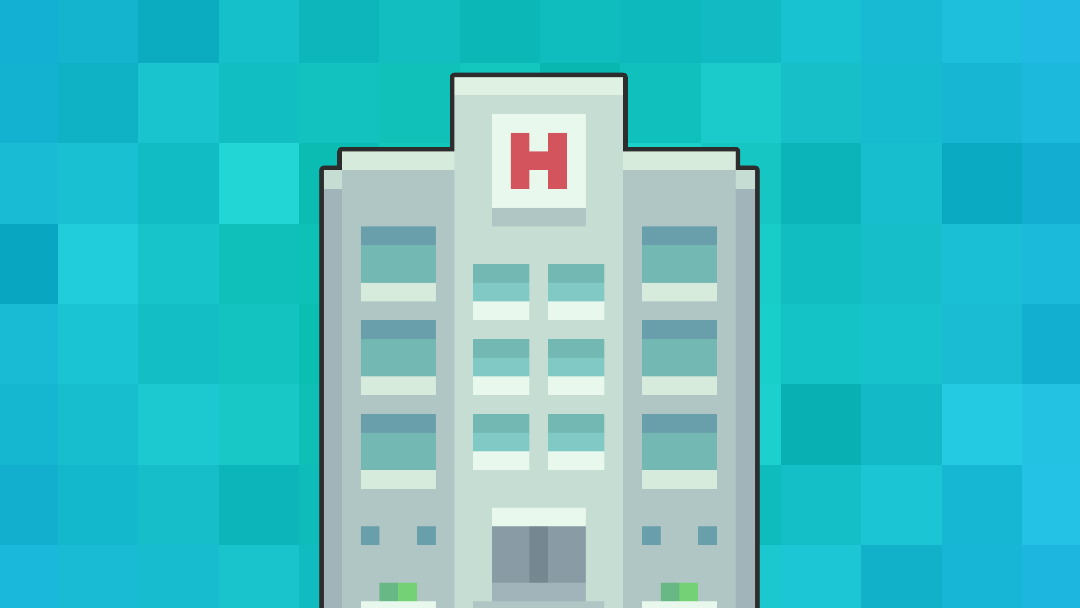- 📖 Geeky Medics OSCE Book
- ⚡ Geeky Medics Bundles
- ✨ 1300+ OSCE Stations
- ✅ OSCE Checklist PDF Booklet
- 🧠 UKMLA AKT Question Bank
- 💊 PSA Question Bank
- 💉 Clinical Skills App
- 🗂️ Flashcard Collections | OSCE, Medicine, Surgery, Anatomy
- 💬 SCA Cases for MRCGP
To be the first to know about our latest videos subscribe to our YouTube channel 🙌
Introduction
Your first medical ‘on-call’ or ‘after-hours’ shift can be an anxiety-inducing prospect, and this is an experience common to all doctors.
Although some of the situations you are presented with may be new and daunting, it is important to acknowledge that there is always help at hand. Always know your hospital’s escalation policy before starting the shift.
Each hospital and department will work slightly differently, but in this article, we will cover general features of the medical on-call shift to give you more confidence going on-call for the first time.
The on-call medical team
Every hospital will have a different system and staffing, but generally, there will be at least one medical registrar, one SHO (FY2 and above) and often one FY1 doctor for each on-call medical team. The medical registrar will be the hospital’s most senior medical team member outside of normal working hours.
The FY1 may be responsible for all medical patients across all wards in smaller hospitals. However, in larger hospitals, there will be multiple medical FY1s attached to specific wards or teams. These teams may be generalised (general medicine/acute medicine/geriatrics) or cover specific medical subspecialties (e.g. respiratory/cardiology/gastroenterology).
It is important to know exactly which patients/wards you are covering during your shift – this information should be explained to you before the shift starting.
There will often also be some senior nursing staff who can greatly assist during the shift. There will almost always be a hospital co-originator or ‘bed manager’ present, a senior nurse manages the hospital overnight. They are a wealth of knowledge and also often have significant ward experience.
Depending on the hospital, there may also be other members of the nursing staff (e.g. nurse practitioners, clinical nurse specialists, healthcare assistants) who can assist with tasks such as blood taking or IV cannulation.
Handover
The shift will generally start with a handover, where the outgoing team meet with the oncoming on-call team. Although the structure may vary, this meeting is common to all hospitals and departments. At the start of the meeting, there will be introductions and a brief register to ensure that all expected team members are present.
Always introduce yourself to all team members, and ensure you have their contact details before the handover ends.
The new admissions are discussed in turn, and this group of patients is often colloquially known as the medical ‘take’. As well as the medical ‘take’ patients, any other patients of concern within the hospital will also be discussed during the handover.
It is important to listen out for any patients on (or will come to) the ward or area you are covering and use this opportunity to ask any questions you may have about their care whilst the whole team is present.
At the end of the meeting, phones/pagers are ‘handed over’ from the old to the new team, alongside any outstanding jobs or tasks that need chasing.
Depending on the preceding shift, there may be very few jobs to hand over, or there may be a long list. This is part of the normal ebb and flow of hospital medicine, and it is important to take these jobs graciously – the previous on-call team have worked hard to make this list as small as possible!
Each hospital will have a different makeup of the out-of-hours team, but the important principle is to know what resources are available to support you when required. Your team will often stay the same over a run of on-call shifts, and there is a great sense of camaraderie between the on-call team as you are all working together for a common goal of patient care – many great friendships have been forged during an on-call night shift!
Take and post-take
As mentioned above, the ‘take’ is the colloquial name for the cohort of medical patients admitted during a particular day or shift. If you are allocated as the ‘take’ F1, your job will likely involve clerking new medical patients referred by the emergency department, and presenting these to senior doctors to consider medical admission to hospital.
If handover is within normal working hours (i.e. a morning handover), there may also be a ‘post-take’ team present, led by a medical consultant. This consultant is typically the same consultant that was on-call overnight, and you may also hear them referred to as the ‘on-take’ consultant.
The job of the post-take team is to conduct a ward round of all of the newly admitted (‘take’) patients from the previous day, colloquially known as the ‘post-take ward round’ (PTWR).
It is standard practice that every newly admitted patient must be seen by the admitting specialty consultant within 24 hours of admission. If you are allocated as the ‘post-take’ F1, your role will involve rounding with the post-take consultant and following up on tests and investigations ordered during the ward round.
Ward cover
If you are neither the ‘take’ or ‘post-take’ F1, your job will likely be ‘on-call‘ or ‘ward cover‘. This involves covering the medical wards and providing care to patients outside of the hospital’s regular working hours. The following principles will be common to all of these roles, where there are almost always different competing priorities that require triage.
General principles & triage
Each hospital will have a different job allocation system for the on-call junior doctor covering the wards. There may be an online system or a phone or pager you carry for the nursing staff to contact you.
When a patient is critically unwell, there will be an emergency call system. These calls require your immediate presence, and you will be supported by senior members of the medical team – often a medical registrar and a representative from intensive care. All calls beyond this will require you to triage them in order of importance. Jobs will range from charting medications or fluids to assessing acutely deteriorating patients on the wards.
Triaging calls and jobs
Everybody will develop their own triage system, but a key skill is gathering as much information as possible while taking the call. Whatever the situation, it is generally useful to get a full set of observations of the patient, as this gives an objective reading of the patient’s clinical state. It is also important to ascertain whether the problem of concern is new or persistent.
In general terms, a new or evolving problem will need to be seen more rapidly than a problem that has been persistent for a whole admission.
Asking how concerned the nursing staff are about a patient can also be a helpful indicator of acuity. Senior nurses especially will know when a patient needs urgent attention. Some senior nurses will be happy to monitor a patient whilst you are busy with other tasks and call you back if the patient appears to be deteriorating.
You can ask the nursing staff to try certain therapies before you arrive, particularly if there will be a delay until you can see the patient. For example, asking for a pre-arrival ECG and to trial some GTN spray is important in a patient with cardiac-sounding chest pain. Many nurses can also insert a cannula or take bloods before your arrival.
If the nurses have significant concerns about a patient and you are with another unwell patient that you do not feel you can safely leave, it is always reasonable to ask them to put out a medical emergency call, as this will ensure the patient is promptly assessed and treated.
Keeping organised
Keeping an ordered list of tasks you have to do and having a sound triage system to determine in which order you will prioritise these jobs is invaluable.
This again will come with time, so do not feel ashamed to ask for help or advice from colleagues/seniors if you feel like there is too much on your plate – particularly if there are multiple unwell patients at the same time.
Common on-call jobs
Common on-call jobs when covering the medical wards may include:
- Reviewing acutely unwell patients
- Prescribing analgesia and fluids
- Prescribing medications
- Reviewing confused and agitated patients
- Verifying death
See our guides to assessing patients with abnormal observations and common on-call jobs.
End of the bed survey
When you get to the ward, always take a quick glance at the patient before all else. An end-of-the-bed survey can guide whether you will need to jump in for an immediate ABCDE assessment (i.e. the patient looks unwell) or whether you have time to gather some information on the patient before assessment.
Key things to acquire from the medical documentation will be the initial reason for their hospital admission and current management, other co-morbidities that may be contributing to this acute change in condition, and functional background/ceiling of care (Is there a DNAR in situ? Would this patient be for escalation to ICU?). With this information in mind, you can perform a much more comprehensive assessment whilst considering the underlying differential diagnosis.
Escalation and seeking help
It is important to alert your senior about any deteriorating / unwell patients you have reviewed and hand them over to the next junior doctor at the end of your shift for re-assessment to ensure they are on a stable or improving trajectory.
Your senior doctors will remember their first shifts and expect to be contacted if you have any concerns or worries. This is especially true during the first few weeks and months of a job or rotation. If at any point you are concerned about a patient’s clinical status, and you feel like you are out of your depth or need more help quickly, do not fear to press the emergency buzzer – it exists for that exact reason!
Dealing with unfamiliar situations
When on-call, you may be faced with unfamiliar situations. Remember that core principles can be applied to all scenarios (e.g. is this an acute change in clinical status or chronic problem? Does the patient look unwell?).
Medicine is always unpredictable, and some situations you are presented with may even be novel to your senior doctors. It is important to remember this and always seek further help when you feel out of your depth!
Conclusion
It is important to recognise here that medical ‘on-call’ shifts can feel stressful and, at times, overwhelming.
These shifts can undoubtedly be busy and challenging, but with a good team around you, it can be an invaluable learning experience and sometimes even a lot of fun! It is important to have a good knowledge of the key logistics of your role (who you are covering, hospital escalation policies etc) to minimise the stress when difficult clinical situations arise.
The art of triage comes with experience, and each doctor will have their own methods, but the above general principles can be used as a guide until you develop your own personal strategy.




